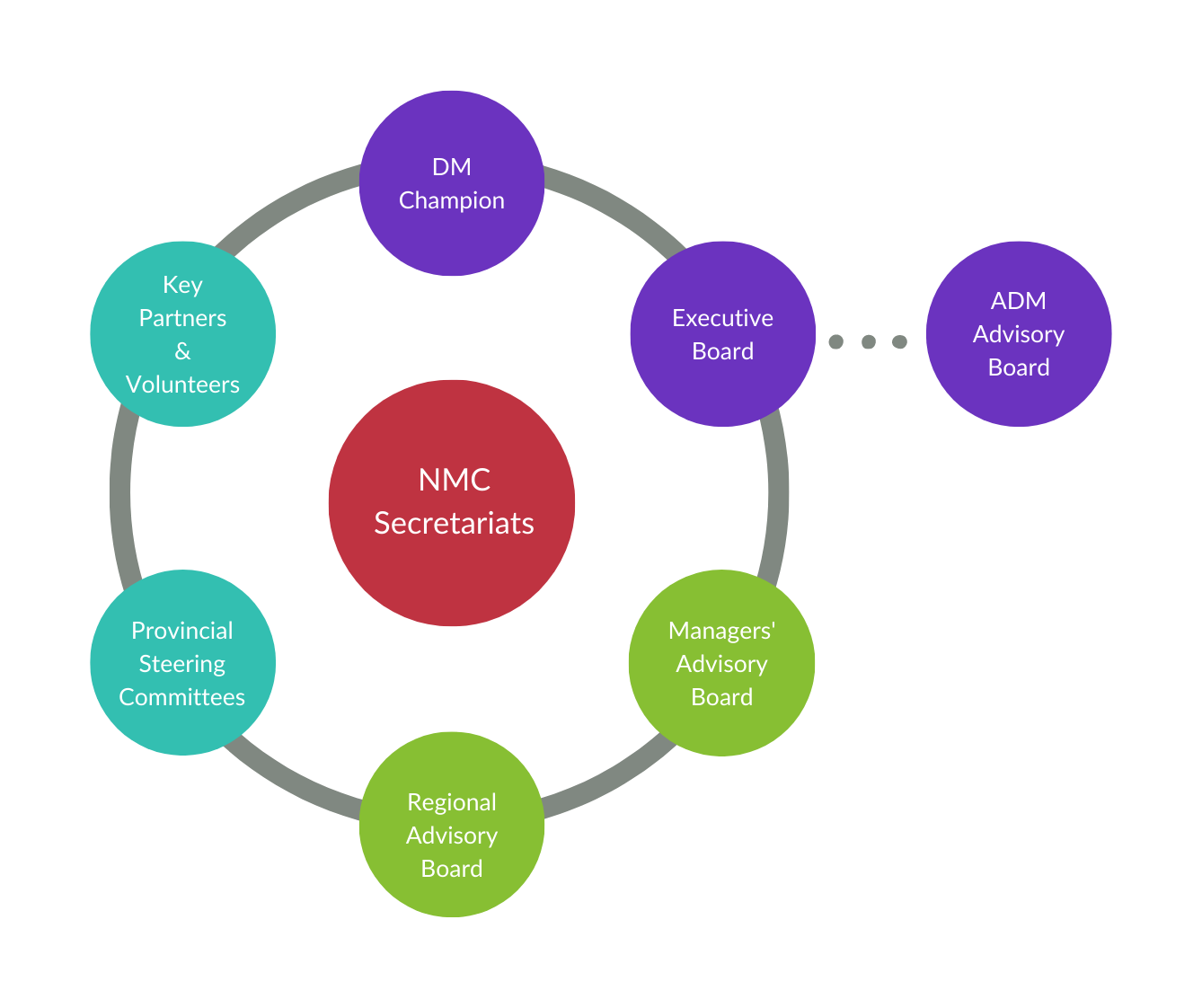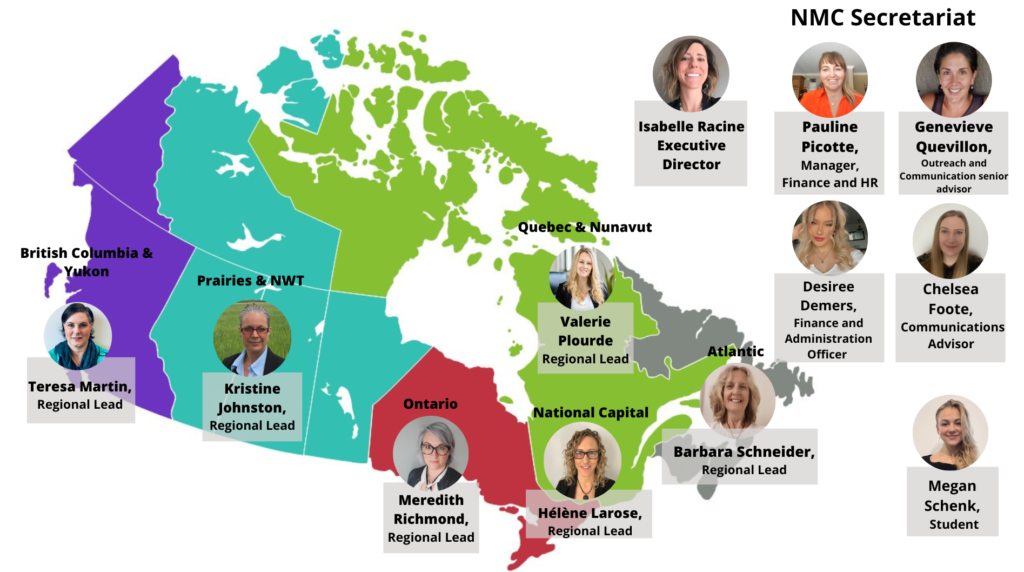Prepared for the Clerk of the Privy Council, by the National Managers’ Community
Publication Date: March 31, 2023
NMC Annual Report 2022 PDF version – Plain text follow on this page.
In this report
- Territory Acknowledgement
- Message to the Clerk
- Executive Summary
- How we work
- How we accomplished our work
- NMC strategic agenda
- 2022 symposium and regional Learning Days
- NMC Secretariat in 2022
- Looking Ahead
- Acknowledgements
- Ongoing partnerships and engagement
- Amplified partner-led opportunities
Territory Acknowledgement
The National Managers’ Community is grateful to work on many traditional territories and Treaty lands, also known as Canada. To acknowledge these traditional territories is to recognize their longer history, one predating the establishment of the earliest European colonies. It is also to acknowledge the territories’ significance for the Indigenous peoples who lived, and continue to live, upon them – people whose practices and spiritualities were tied to the land and continue to develop in relationship to the territory and its other inhabitants today. For settlers on these lands, we must remain accountable to these relationships and commit to ongoing reflection on and understanding of the impacts colonialism has and continues to have on the First People’s as we continue to live, work, and play on the lands they have protected since time immemorial. We encourage everyone to reflect on the role they play in reconciliation and commit to action to moving this process forward.
Message to the Clerk
To the Clerk and Deputy Clerk of the Privy Council
As Champion and Executive Director for the National Managers’ Community (NMC), we are pleased to submit to you our 2022 Annual Report. In this report, you will see that the NMC provided the management community with resources that supported managers’ capacity to drive public service renewal and enhance leadership excellence by delivering a wide array of experiences and events.
We championed culture change in the public service, providing managers with skills to deliver outcomes consistent with the Call to Action and the Accessibility Strategy through our ongoing engagement and collaboration with employee networks and government departments.
The NMC remains committed to ensuring that the future of Canada’s public service will be more agile, diverse, accessible, and inclusive. To achieve this, we have elevated the voice of managers, promoted collaboration and connection across the country and interdepartmentally, and enhanced our outreach and engagement.
Through our work, we hope to continue our legacy of co-operation and innovation that our ongoing partnership with the Canada School of Public Service provides. With their sponsorship, we can continue to raise the profile of the management community and support the Government of Canada in their quest to recruit and retain the best leaders it can.
Executive Summary
As the Public Service navigates through rapidly changing and complex social, environmental, and public health crises, managers have been increasingly called upon to rise to the occasion and lead the way forward. The need for access to best practices, tools for collaboration and engagement, as well as channels for ongoing communication with senior leaders has never been clearer.
The NMC is proud of the work we accomplished over the past year and we celebrate the ability to leverage our partnerships and gain a deeper understanding of managers’ needs through data analysis. In hearing directly from the managers, the NMC tailored programs and outreach to give them the tools and resources they want the most.
In keeping with the rest of the Government, the NMC shifted the way of working and piloted a hybrid virtual and in-person Managers Connect series to engage with audiences in meaningful and impactful ways.
As we move forward in 2023 and return to offices, we will pivot once again to provide support and resources in a manner consistent with this new direction. We will remain focused on listening to the voices and needs of the management community and we will foster the creation of new and meaningful connections among public service leaders.
How we work
The mission of the National Managers’ Community is to amplify the voices of managers across the country, support their communication with Senior Leaders, and promote the pursuit of excellence by managers in the Public Service.
The NMC network is leveraged by Departments and Communities to ensure that new initiatives being developed align with the reality of what managers need and are facing every day.
By collaborating with key stakeholders, the NMC is offering managers prompt and relevant activities on issues affecting their evolving responsibilities.
In 2022, the NMC added an executive board to the governance structure. While working directly with the DM Champion, this committee provides not only strategic advice but also ensures the NMC stays relevant and focused on the key issues in the public service.
Supported by our Deputy Minister Champion, executive board, advisory boards, provincial steering committees, and stakeholders/key partners, the NMC develops innovative ways to reach and support managers and aspiring managers across departments and regions.

How we accomplished our work
NMC’s Mission
Supporting managers as they work towards achieving excellence in the public service.
The NMC will enable the achievement of our strategic agenda by:
| ACTING AS A 2-WAY COMMUNICATION ENABLER Advancing public service priorities and promoting the needs and interests of managers to senior leaders- and central agencies, while showcasing the essential role played by managers. | UNDERTAKING OUTREACH AND PROMOTING ENGAGEMENT Facilitating dialogue and acting as a knowledge broker, exchanging information and sharing best practices, while growing NMC’s network. |
| COLLABORATING AND CONNECTING Working with key partners to provide avenues for managers to connect with their peers and engage with senior leaders. | SUPPORTING RENEWAL Increasing awareness and the impact of the NMC across Canada and ensuring its sustainability and relevance. |
NMC strategic agenda
To sustain and enhance managers’ capacity to drive public service renewal
This year the NMC continued to evolve and provide meaningful and impactful experiences for managers as well as form important collaborations across the Government of Canada to ensure ongoing service excellence.
The following pages highlight the major work the NMC has carried out in support of our strategic agenda.
While they have been separated by theme, it is important to note that events and engagements often encompass all pillars of our agenda.
Build a diversified and inclusive public service
Supporting Black and racialized employees, Indigenous Peoples, employees with disabilities, religious minorities, and others who continue to face barriers in the workplace.
Thrive in the post-pandemic workplace
Being mobilized and agile with a focus on wellbeing.
Being ready to support their team(s) during the transition.
Promote innovation and optimize performance
Fostering and growing talent; demonstrating a continuous learning and development mindset.
Helping to shape the future of Canada’s public service.
One that will continue to be more agile, diverse, accessible, and inclusive.
Leading with Data – Call to Action
This past year, the NMC undertook a detailed analysis of the departmental letters sent to the Clerk of the Privy Council’s Office in support of the Call to Action. We did a deep dive into efforts occurring across the government to provide training and raise awareness and how this supports public service managers. In doing so we were able to find potential gaps and this knowledge informed our ongoing conversations with key stakeholders.
NMC addressed these gaps by providing events that focused on increasing competencies to actively address inequities and amplified the work of various departments aimed at increasing representation in leadership that matches the diversity of Canada.
We also shared our analysis with the Privy Council’s Office, the Centre for Diversity and Inclusion at the Treasure Board Secretariat, as well as the Respectful and Inclusive Workplace team at the Canada School of Public Service to inform the work they were doing in support of this initiative.
Methodology:
- Review of all 88 CTA letters
- Creation of subcategories of analysis
- Focus on information relevant to the NMC (mandatory training for managers, guest speakers, grassroot/horizontal network, etc.)
- The most common mandatory training is Unconscious Bias (representing 34% of the employee mandatory training).
- Summary of information
Examples of Learning resources made available to employees:
- Manager’s Toolkit on Hiring Persons with Disabilities;
- Blogs and Podcasts by Black Employees;
- Ethnocultural Toolkit to all Employees;
- Training Communiqué on Gender Considerations;
- Practical Guide for Managers and HR Advisors on Inclusive Recruiting;
- One-Pager on How to Avoid Bias.
Leading with Data – Public Service Employee Survey
The NMC also worked closely with the OCHRO Analysis and Measurement Team to understand the data obtained from the 2020-2021 Public Service Employee Survey (PSES) as it related to middle managers.
We learned that in 2020-2021, managers were reporting stress at the same levels as executives and highlighting increased workload with less support and resources as reasons contributing to this. In 2022 the NMC focused on providing enhanced mental health and skill-based events to address this gap.
| Our managers: Mental Health & Wellbeing | Executives | Managers |
| Experience “high” or “very high” levels of work-related stress | 30% | 25% |
| Feel emotionally drained after their work day | 47% | 41% |
| Have to do the same or more work, but with fewer resources, is affecting their quality of work | 48% | 49% |
Heavy workload is the top source of stress for managers and executives.
Risk of exposure to COVID-19 is the top source of stress for other employees.
Other key findings indicated that the majority of executives and managers report managing employees working remotely. Further, they both report being moderately equipped to support employees in their work unit experiencing mental health issues. There was ambivalence surrounding whether their department or agency had provided them with adequate training and/or resources to manage a remote team.
Also notable: although managers and executives were not feeling entirely equipped or supported in the virtual environment, employees were generally satisfied with management over the first year of the pandemic.
As a result of these findings, the NMC focused many of our events on providing managers with both the best practice information and competencies required to provide the best support to staff and students in a hybrid environment.
| Our managers: Covid-19 | Executives | Managers |
| Since the start of the COVID-19 pandemic, have managed employees working remotely | 99% | 89% |
| Feel equipped to support employees in their work unit who are experiencing mental health issues | 80% | 71% |
| Feel their department or agency has provided them with adequate training and/or resources to manage a remote team | 62% | 55% |
| Other employees | |
| Are satisfied with the workplace accommodation measures that were implemented | 82% |
| Report that their immediate supervisor supports their mental health and well-being | 78% |
| Are satisfied with the quality of supervision they receive | 82% |
Key findings:
- Results indicate that although managers tended to feel under-supported, their employees were satisfied with the quality of supervision that they received.
- Given the elevated levels of stress faced by Managers, the NMC will continue to develop and share resources to improve wellbeing at work.
- Upcoming surveys will be critical to understand whether managers still experience the same need for support in the virtual working environment, three years later.
- The NMC will benefit from pulse surveys to better understand the experiences of managers living up North.
The NMC also conducted an analysis of the 2021 Student Exit Survey as well as the 2022 FlexGC User Questionnaire.
Results from the FlexGC survey were collected between August 25th and September 16th, 2022, and show that although managers may be lacking in terms of mental health support in the remote working environment, the shift to virtual working has been otherwise satisfactory. The majority feel as though they are still able to meet their team collaboration needs, as well as diversity and inclusion goals.
Overwhelmingly, Managers surveyed were in support of the remote working model, followed by a Hybrid model. It will be interesting to see if these results shift as managers adapt to the Common Hybrid Model. It will be imperative for the NMC to provide the support and resources required to help with this transition.
| Our Managers: FlexGC 2022 | Well | Not well |
| “As it pertains to your personal situation, how well do you consider your department or agency is managing change for the following elements?” | ||
| Mental Health & Wellness | 41% | 59% |
| Team Collaboration | 77% | 23% |
| Diversity & Inclusion | 66% | 34% |
“If you had the choice, which work model would you prefer to follow?”
- 1.9% Full-time on site
- 27.2% Hybrid (a weekly mix of on-site and remote work)
- 70.9% Full-time remote
The student exit survey shows that they felt well supported by their managers and had an overall very positive onboarding experience. The NMC continued to provide managers with the tools they need to recruit, train, and assist their students.
| Our Managers: Students’ Response | |
| Are satisfied with the welcome they received from their manager | 93% |
| Agree that their immediate supervisor supports their mental health and well-being | 88% |
| Report that their manager was available for meetings or consultations | 92% |
NMC Session Feedback Forms
Data gathered throughout the year during NMC events was also analysed to inform upcoming offerings to meet managers’ needs.
Building a diversified and inclusive public service
Since the launch of the Call to Action in 2021, the NMC has focused on providing managers with the skills to move beyond just awareness to create meaningful and sustainable change and address barriers and disadvantages in the public service.
We have enhanced our partnerships with employee networks like the Public Service Pride Network and Muslim Federal Employee Network, for example, and supported their messages and resources through our large audiences.
In advancing the Accessibility Strategy, we continued to provide opportunities for collaboration and consultation with departments such as the Office of Public Service Accessibility and initiatives as the Government of Canada Diversity and Inclusion Symposium, and the Canadian Innovation Centre for Mental Health in the Workplace.
Through our virtual events, we have augmented the work of the Public Service Commission around inclusive recruitment tools and provided managers opportunities to learn about how to best use them during their processes.
We were a member of the Diversity and Inclusion’s (CDI) evaluation committee at the Treasure Boardy Secretariat in helping to set the path forward for the CDI program.
The NMC coordinated a manager-level consultation about the changes to the Employment Equity Act and compiled written feedback from surveys as well as focus groups to provide a presentation to the Office of the Chief Human Resources Officer (OCHRO), ensuring the voice of managers was amplified during this process.
“The goal of the Public Service Pride Network (PSPN) is the full inclusion of 2SLGBTQIA+ employees in the Public Service. In 2022, the NMC was instrumental in helping the PSPN achieve this goal by including us in several of their Regional Learning Days. At these events we were able to connect with managers across the public service and provide them with information on how the PSPN can support them in creating a safe space for 2SLGBTQIA+ employees in their organizations.”
PUBLIC SERVICE PRIDE SHOW YOUR COLOURS

The NMC hosted Dr. Rachel Zellars and her presentation Combatting Unconscious Bias, in which she shared several actions that could be taken individually and collectively to combat racial discrimination in the workplace.
During our Virtual Symposium, the NMC held many different events: there were many opportunities for managers to exchange information on the theme inclusion.
Power of Attraction: Discussion on Recruitment and Retention: panelists provided innovative ideas and lived experiences to equip managers with tools to ensure inclusive human resource practices.
Vulnerable Leadership: Having Compassionate Conversations: this discussion with diverse leaders provided insight and tips on how to have challenging conversations as well as supporting employees to come to work as their authentic selves.

How to Handle Microaggressions in the workplace: Camille Dundas, editor-in-chief of Canada’s largest black online magazine and listed as one of the top 100 Accomplished Black Women in Canada, lead this engaging presentation grounded in intersectionality that shared competencies for inclusivity and provided concrete skills to handle microaggressions in the workplace.
It’s always critical for mainstream networks to utilize their privilege and showcase groups that have less of a platform. The National Managers’ Community does this well and it’s in big part due to the active allyship.
Dirigeant de la diversité et de l’inclusion Réseau fédéral des jeunes
The Community (NMC) is a key partner for the Office of Public Service Accessibility (OPSA) on several central projects. First, the NMC is the gateway and a direct point of contact for learning about the needs of managers across the public service.
Office of Public Service Accessibility
The NMC, OPSA and the Canada School of Public Service had the opportunity again this year to work together to develop a series of events on one of the top priorities of the Accessible Canada Act and Nothing Without Us: Accessibility Strategy for the Public Service of Canada: Recruitment, Retention and Promotion of people with disabilities. The series reached thousands of hiring managers across the country, promoting the various pools and initiatives to reach the Strategy’s goal of hiring 5,000 new employees with disabilities by 2025.
In addition, NMC has been a valuable partner in promoting and using the GC Workplace Accessibility Passport. Because the Passport is a manager-employee agreement, the NMC supported OPSA by actively promoting and participating in GC Workplace Accessibility Passport workshops. OPSA and the NMC developed and facilitated a new workshop for managers that attracted over 540 people in December 2022.
Thriving in a post-pandemic world
Managers continued to lead the way as the majority of the public service pivoted to returning to the office and skills to manage truly hybrid teams became even more important. The NMC leveraged our connections and provided evidence-based information to ensure managers felt ready to support their teams to provide the public with the programs and services they have come to expect. An example of amplified work is the ESDC Future of Work playbook.

The virtual symposium partnered with academic, Wayne Corneil from the Telfer School of Management at the University of Ottawa, and with The Hybrid Workplace Series (Canada School of Public Service) to deliver events addressing the competencies and skills required in the workplace.
Management Competencies in the Hybrid Workplace: key principles needed to lead teams in the hybrid work environment.
Best Practices for Managers: panelists shared valuable lessons based on recent experimentations with the hybrid workplace model.
The Mental Health series addressed the skills needed from managers to support their teams through ongoing changes and upheaval whilst also ensuring their mental wellness:
Managing Organisational Change – The Path Forward, with Christine Breton, Canada Revenue Agency EAP: tips and tools on how to communicate effectively as a leader and support the workforce through change, as well as discussing ways leaders can support themselves while leading through change.

Managing with Intention, with Jenene Wooldridge, Indigenous Author, Executive Director of L’nuey – the Epekwitk Mi’kmaq Rights Initiative, and named one of the top 25 most powerful women in business by Atlantic Business Magazine: Learning how to focus time and energy and to lead with intention and balance by including reflection and the wisdom of the medicine wheel.
“Delivering effective and efficient results for Canadians centres on ensuring excellence in the management of our people and, therefore, the relationship between human resources professionals and managers is more critical than ever. This past year, in navigating new work delivery models, existing labour shortages and the importance of diversity and inclusivity in workplaces, the human resources community has relied on and valued this relationship in which managers can share their knowledge and lived experiences and human resources professionals can provide sound advice, support and guidance. Equally, the Human Resources Council has valued its close collaboration with the National Managers’ Community, linking government-wide people management priorities with the imperative to ensure healthy, safe, productive and inclusive workplaces.”
Aaron Feniak, Executive Director, Human Resources Council
Promoting innovation and optimizing performance
The NMC recognizes the importance of providing ongoing development and growth opportunities to managers in support of innovation across the public service. Equally important is ensuring managers have access to the support and resources they need to continue building their careers.
Through the partnership we have cultivated with the DPI Association of Public Sector Information Professionals, the NMC promoted a virtual opportunity for managers to learn from industry leaders and government thought leaders during the DPI professional development week. Topics presented included digital leadership, IT and IM, change and agile project management as well as technology and innovation.
Over the last year, APEX and the National Managers’ Community (NMC) have strengthened their relationship and sought opportunities to evolve programming to include a series of learning events for both aspiring and new executives. This successful collaboration of June and December learning sessions attracted more than 2,000 combined participants and a very high level of engagement and interest in future sessions. This engagement also led to the development of a joint practical guide for middle managers and aspiring directors! Our organizations wish to ensure our next generation of executives are ready to embrace a dynamic future; feel supported in their leadership development journey, including their readiness for the change in role, mindset, and responsibilities required to successfully transition from being a manager to being an executive.
Carl Trottier, APEX CEO
In collaboration with The Association of Professional Executives (APEX), the NMC provided a 2-part virtual series in June and December entitled “Making the Leap to the Executive Rank”. These conversations with executive-level panelists shared observations and opinions on their role and the challenges and opportunities of the transition. They offered candid insights and inspiration to aspiring and new executives to prepare for the change in role, mindset, and responsibilities.
In February and March of 2022, the NMC supported the development of Peer Coaching Circles by providing facilitator training to 26 English and 8 French managers across Canada. These train-the-trainer sessions allowed managers to grow, learn, and evolve their leadership practice in a safe and dynamic environment.
Today, we have initiated 22 different Peer Coaching Circles that drew 229 registrants.
Quebec promoted its unique approach, Co-development, and provided a virtual event as well as access to a network of 20 departments providing these groups to managers and aspiring managers across the region:
Demystifying co-development: facilitators explained co-development: what is expected of participants and its benefits. In addition, there were testimonials from two current participants in co-development groups who talked about their own experiences and shared the benefits for managers.
Training to facilitate Peer Coaching circles allowed me to deliberately practice listening and increased the quality of my questions. It helps me stay present and thoughtful in all that I do in my regular position and reminds me to keep focused on others’ input and stay out of my head so much. The result is improved contributions to the group, my Agency and the public service.
Jennifer Hundleby-Anthony, Portfolio Manager, Staffing Operations, CFIA
The 2022 NMC symposium & Regional Days
During this year’s symposium, the NMC delivered an opportunity for managers from across the public service to explore the impact that they have within their organization and what they need to thrive in their unique role. The theme, “Managing in our Changing Work Reality” offered a three-day experiential journey that provided participants exposure to inspiring insights from keynote speakers, departmental influencers, innovative thinkers, and other guests.
Other sub-themes included: thriving in the hybrid workplace; advancing the Call to Action while nourishing diversity and well-being; and recruiting, retaining, and developing new and existing talent.
The 2022 symposium significantly increased our participation and reach from our inaugural offerings in 2021, with over 4052 unique participants who engaged with our events over 10,000 times. We provided 6 different sessions as well as a lunch and learn event involving several different Diversity Networks.
We are grateful for our partnership with the Canada School of Public Service that makes this type of event possible for us. We were able to collaborate with their Hybrid Workplace Event Series and Equity, Diversity and Inclusion Conference to provide impactful learning events. The symposium also benefited from the co-hosted event with the Canadian Innovation Centre for Mental Health in the Workplace at Innovation, Science and Economic Development Canada.
| 50% increase participation compared to 2021 |
| Thriving in the hybrid workplace sessions Total of 5 129 managers participants |
| Recruiting, retaining, and developing new and existing talent sessions Total of 2 530 managers participants |
| Advancing the Call to Action while nourishing diversity and well-being sessions Total of 2 045 managers participants |
The National Managers’ Community is a strategic partner both nationally and in the regions in enabling the Public Service Commission to deliver important messaging to hiring managers about our products and services and how the PSC can support them in their recruitment efforts.
The NMC supports the PSC in gaining important feedback from hiring managers by providing an in-person forum to consult through these meetings and more formally through the NMC/PSC Consultative Committee, and by facilitating online surveys to their membership.
Public Service Commission of Canada
NMC Regional Days
In 2022 the NMC was able to provide in-person Regional days to enhance the symposium and pilot a hybrid information-sharing and networking engagement strategy.
Each region successfully developed a full day of enriching, diverse, and participatory content to support their unique needs. By partnering with the Federal Youth Network and Governexx in BC, the NMC was able to reach managers as well as aspiring managers. And in Ontario, the Prairies, and the Atlantic regions, Executives joined for mentorship opportunities.
Engaging the audience in thought-provoking and challenging conversations about diversity and inclusion in the public service was a central theme.
In Moncton, the Atlantic region hosted the Commission on Systemic Racism from the Government of New Brunswick to give the keynote on “How to take the anti-discrimination journey”.
Winnipeg provided a presentation on “Trauma-informed Leadership” and in Ontario, representatives from the Anti-Racism Ambassadors Network, Public Service Pride Network, Knowledge Circle for Indigenous Inclusion, Accessibility, Accommodation and Adaptive Computer Technology (AAACT), and Building Diverse Leadership Program, among others, were present to support individual learning.
In Vancouver, participants watched the powerful video testimony by Deputy Minister Daniel Quan-Watson sharing his personal experiences of racism, including as a public servant.
Throughout the month of November these learning days engaged with over 300 participants, 20 different information booths and 10 different speakers and presenters.
I have never attended an event that was focused on teaching managers specific skills they can cultivate and apply to help their teams. I appreciated this lens.
~anonymous manager
The Secretariat in 2022
Our Leads, with the support of the administrative and communication team, support the horizontal work of the NMC as well as bring the regional lens to everything we do. Through ongoing collaboration with our steering committees and regional federal councils, we can ensure a holistic understanding of the pressing issues faced by managers across the country, reinforcing our mission of promoting a diverse and inclusive public service.

Managers now more than ever need the support of the NMC and strong networks. Regions can feel even bigger today with hybrid work expanding the ways we connect and manage the work we deliver.. The NMC is important bringing this key community together and enabling leaders to grow and shape the future culture of the Public Service.
Cheryl Baraniecki, Executive Champion, Prairie Region
Through our development of the Building Diverse Leaders Program (BDLP), a grassroots initiative sponsored by the Ontario Federal Council, we have had the fortune of collaborating with the Ontario NMC in our consultation framework, attending the Ontario NMC Learning Day, and sharing best practices and resources to further enhance our program.
Latricia Beeston and Pape Diagne, BDLP Management
Regional PSC team members are members of their regional NMC steering committees and meet on a regular basis to work collaboratively on initiatives to support managers across their respective region and to promote our tools and programs that support the achievement of a more diverse public service.
Public Service Commission
Looking Ahead
The NMC remains committed to providing supports and resources that are grounded in evidence. As such, we will continue to analyse available data from our partners and stakeholders as it relates to managers and their experiences and needs. We will prioritise a new NMC Pulse Survey to focus on the impact of current changes in the government of Canada and collaborate horizontally to create and manage specific datasets to inform our work in 2023.
We will enhance our relationships with departmental manager communities to promote their ongoing work and leverage our connections to strengthen their collaborations.
Managers are facing the task of implementing the Common Hybrid Model across all workplaces and creating space for sharing successes and best practises is a role the NMC is well positioned to play. It is imperative, as we move forward as a public service, that this inevitable change does not disadvantage anyone. The NMC will maintain our focus on moving the Call To Action to concrete skill acquisition and sustainable change so that no one is left behind.
We will finish our 3-part series with APEX with a final virtual event for “Making the Leap to the Executive Rank” as well as promote our co-created “Practical Guide for Aspiring Executives” while our regions build mentoring networks to assist managers in their career development goals.
We will evolve our engagement and networking hybrid series with more regional in-person learning days and individual virtual symposium events spread throughout the year.
Evolving through renewal and increased membership from coast-to-coast will ensure the NMC remains current and ready to join with managers on the journey that lies ahead.
Acknowledgements
This annual report was prepared with the assistance of the following members of the National Managers’ Community Secretariat:
Regional Leads for the National Managers’ Community;
- Atlantic – Barbara Schneider
- Quebec/Nunavut – Martine Daoust, Valérie Plourde (former)
- Ontario – Meredith Richmond, Mary Ann Medaric (former)
- Prairies/Northwest Territories – Kristine Johnston, Lisbeth Savard (former)
- British Columbia/Yukon – Teresa Martin (former)
- National Capital Region – Hélène Larose
Communications & Program Support;
- Genevieve Quevillon, Sr. Communications Advisor
- Chelsea Foote, Hamish McPherson (former), Communications Advisor
- Pauline Picotte, Manager, Finance and HR
- Desiree Demers, Finance and Administration Officer
- Megan Schenk, Student
With special thanks to the volunteer members of the following committees:
- Regional Steering Committee
- Regional Executive Champions
- Regional Advisory Board
- Managers Advisory Board and
- Assistant Deputy Minister Advisory Board
- Executive Board
And special thanks to the community of managers, supervisors and aspiring managers who work so hard to create and support teams, services, processes and enabling systems that ultimately deliver to the public whom we all serve.
For questions or comments, please send your inquiries to: nmc-cng@csps-efpc.gc.ca
Ongoing partnerships and engagement
- HRC/PSC Working Group on Hiring of Persons with Disabilities
- Privy Council Office – Beyond2020 Champions and Coordinators
- Heads of functional communities
- Council of the Network of Official Languages Champions
- HR Communities of Practice Hub Meeting
- GC Mentoring
- GC Workplace Accessibility Passport (OPSA)
- GC Diversity, and Inclusion Conference
- Centre for Diversity and Inclusion evaluation group – Treasury Board Secretariat
- Federal Youth Network – Podcast, Bootcamp and in-person learning days
- Office of Chief Human Resources Officer – Employment Equity Act Review Task Force; Pay pension sector consultations; Future of work team
- Public Service Procurement Canada – HR-To-Pay presentations and consultations; Change Leadership Committee; Reduction of acting consultations
- Shared Services Canada – NextGen Pay presentations
- Public Service Commission – student hiring programs; personnel psychology department
- Innovation, Science and Economic Development Canada – career progression presentation
- Employment and Social Development Canada – manager forum support
- Canada School of Public Service – mental health learning advisory committee
Amplified partner-led opportunities
Events:
- Data Conference 2022, Statistics Canada, Canada School of Public Service
- Data Privacy Week 2022, Public Service Information Community Connection
- Leadership Series, Canada School of Public Service
- Professional Development Week, The Association of Public Sector Information Professionals
- Leadership in the Modern and Post-Pandemic Context Series, Université Laval’s Faculty of Business Administration
- FYN virtual learning series, Federal Youth Network
- National Indigenous History Month, Part 2: Environment, Environment and Climate Change Canada
- Public Service Pride Week Public Service Pride Network
- 2022 Closing Event for Students, Federal Youth Network
- Official Languages Day, Canada School of Public Service
- Information Session: Political Activities and non-partisanship in the Public Service, CSPS
- Public servants and political activities: Your role as a manager, Public Service Commission
- Essentials for GC managers: Best practices in accessibility, workplace adjustments and job accommodation, Accessibility, Accommodation and Adaptive Computer Technology Program
- Supportive Leadership: How to Protect and Support Employee Mental Health, Canadian Innovation Centre for Mental Health in the Workplace : Managed by ISED
- Supporting Indigenous Talent, Collaborative effort between the Canada School of Public Service, Public Service Commission, and the Knowledge Circle for Indigenous Inclusion
- Creating Space for Employee-led Experimentation, Canada School of Public Service
- GC Workplace Accessibility Passport: A Workshop for Managers, Office of Public Service Accessibility, Treasury Board Secretariat
Resources
- Manager’s Guide to Supporting Muslim Employees, Muslim Federal Employees Network
- The OL Connection, Official Language Community of Interest
- Setting the tone for official languages (video), Council of the Network of Official Languages Champions
- Guide on Equity, Diversity and Inclusion Terminology (and associated promotional toolkit), Collaborative effort between more than 20 federal departments and agencies
- Public Service Employee Survey Dashboards, Treasury Board Secretariat
- Workplace Accessibility Passport, Treasury Board Secretariat
- Office of Public Service Accessibility Guide, Office of Public Service Accessibility
- Manager’s Toolkit: Leading in a Hybrid Work Environment, Mental Health Commission of Canada, OCHRO
- Guide on Biases and Barriers in Assessments, Public Service Commission
- Indigenous Recruitment Toolbox, The Indigenous Centre of Expertise
- Guidelines for Inclusive Writing, Language Portal of Canada
- Resources for the 16 days of activism against gender-based violence international campaign, Women and Gender Equality Canada
